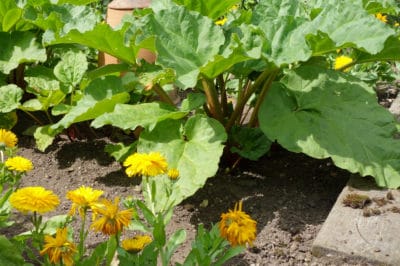What Do Companion Plants Do?
In many cases, companion plants offer benefits to one another. Potential benefits can include:
- Adding needed nutrients to the soil
- Repelling insects, or attracting them away from other plants
- Attracting insects that can help plants, like ladybugs
- Preventing plant diseases
- Adding flavor or aroma to nearby plants
- Providing mutually beneficial growing conditions
Mutually beneficial conditions might include a taller, sun loving plant shielding small shade dwellers, or a spiny, prickly plant protecting other plants from animals.
With rhubarb, companion plants are usually of the variety that attract pests away from the plant, or that simply co-exist well.
What Plants are Good Companions for Rhubarb?
If insects and animals that nibble at your plants are a problem, planting onion and garlic in and around your rhubarb may help. For the most part, these aromatic plants will repel bugs and deter wildlife. Aphids, for instance, dislike onion, garlic, and sweet peppers but love rhubarb; planting these plants together helps protect your rhubarb from aphid infestation.
Columbine flowers are also good companion plants for rhubarb, though the benefit here is for the flower, not the vegetable. Rhubarb repels spider mites, which are fond of columbine. While there is no benefit to your rhubarb, the flowers are pretty! Rhubarb is also a good friend to bean plants, protecting them from black flies.
There are companion plants that work well together, but the benefits to the plants are unknown. Kale, cabbage, broccoli, and cauliflower, members of the brassica family, work well with rhubarb, but no one knows why. While the explanation for this compatibility remains unclear, the fact is that these vegetables grow well together. Turnips fall into this category, too.
Keep in mind that many plants just grow well with other plants. People have grown tomatoes, squash, cucumbers, and more with their rhubarb plants and done so quite successfully. If a pairing or grouping is working for you, that’s great!
Companion arrangements where one plant helps another are a bedrock of organic gardening. When one plant can help another, artificial intervention become unnecessary and your food plants aren’t exposed to chemicals they don’t need.
